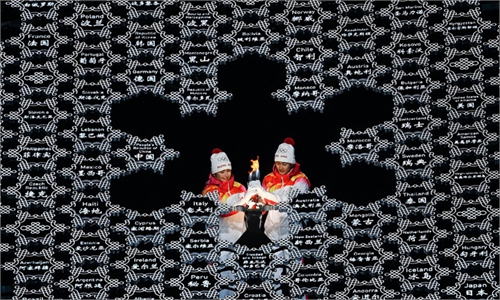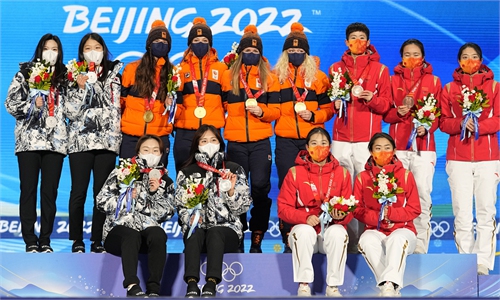SPORT / OLYMPICS
Pedal to the precious metal
Chinese teenagers claim one gold, one silver at Beijing 2022
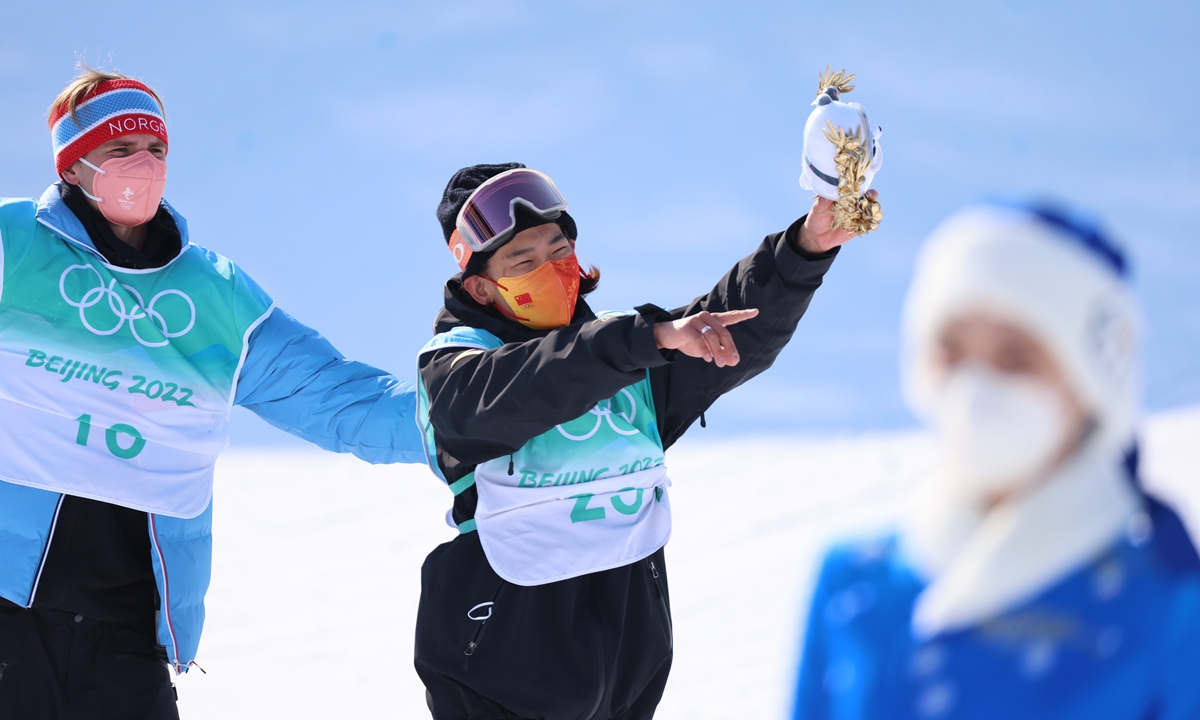
Su Yiming reacts after winning the men's big air freestyle snowboarding gold on February 15. Photo: Li Hao/Global Times
Two of China's top-notch athletes - Su Yiming, 17, and Gu Ailing, 18 - bagged a gold and a silver on Tuesday, respectively, at the 2022 Beijing Winter Olympic Games, breaking the country's best record at Winter Games with the most golds and the most medals ever.
Amid waves of cheers, applause and tears from the spectators and team members at Big Air Shougang in Beijing and watching at home, Chinese teenage snowboarding sensation Su won gold in the men's snowboard big air final.
He made history by winning the sixth gold and the 12th medal for Team China at Beijing 2022, putting China sixth in the medal table currently with six golds, four silvers and two bronzes, breaking the country's best record set in the 2010 Vancouver Winter Olympics of five golds among a total of 11 medals.
Best gift
With Tuesday marking the traditional Lantern Festival for Chinese people and only three days before Su turns 18, the General Administration of Sport congratulated him for becoming China's youngest Winter Olympic champion, adding, "This is the best coming-of-age gift for himself! This is the best Lantern Festival gift for all Chinese people!"
In Tuesday's snowboard big air final, Su scored 89.5 points in the first round and 93 in the second, bringing his combined score to 182.5, soaring to first place as the thrilled spectators burst into applause for his incredible success.
As Su received his gold medal and the Bing Dwen Dwen mascot, the emotional commentator on China Central Television's (CCTV) sports channel declared that Su has "told the world with his actions that 'You guys can never catch me!'"
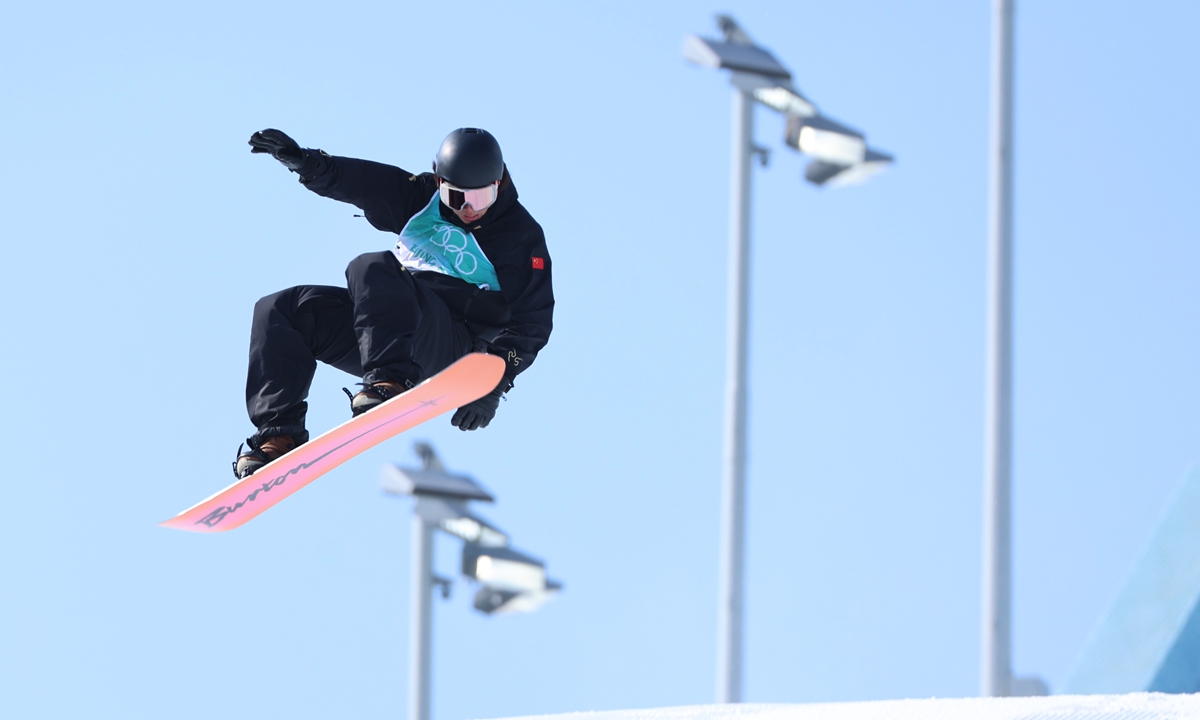
Su Yiming comptes in the men's big air freestyle snowboarding final on February 15. Photo: Li Hao/Global Times
"Like millions of other Chinese youngsters, Su has brought his passion, spirit and vitality to the world," the CCTV commentator said.In tears, Su gave heartfelt thanks to his homeland, and said that "bringing my country glory is the dream from when I was little."
In just three hours after the final, 16 topics related to Su's achievement were trending on China's Twitter-like Sina Weibo. Netizens flooded Weibo with emojis of hearts, flowers, crying faces and Chinese national flags to congratulate him.
"As an old Chinese saying goes, 'Heroes always appear when they are still young ever since ancient times,'" commented one netizen. Others jokingly dubbed the big air final was "The one in which Su already claimed the championship before the event ended."
Others recalled the men's snowboard slopestyle final held on February 7 where Su finished in silver medal position - a result from the controversial scoring that may have prevented Su from winning gold.
The head snowboarding judge later admitted there was a mistake in the judging. During Canadian athlete Max Parrot's championship run, he made a turnover and grabbed his knee instead of his snowboard in one trick, which was not caught by the judges. This, according to the head judge, should have resulted in a deduction of three points, which would have seen Su take gold.
Winner without any doubt
"This time Su has proved by his actions that he is the winner without any doubt. The gold that should have belonged to us Chinese is now back in our hands," said a netizen.
No one would have thought that child star Su who acted in director Tsui Hark's epic action film The Taking of Tiger Mountain eight years ago was a snowboard prodigy in the making. One of his scenes saw him ski down the hills in a smooth yet speedy fashion.
Having started snowboarding at the age of 4, the Chinese teenager stunned the snowboarding world when he landed a Cab (Caballerial) 1800 - one of the most difficult snowboard tricks - at 16 in January 2021.
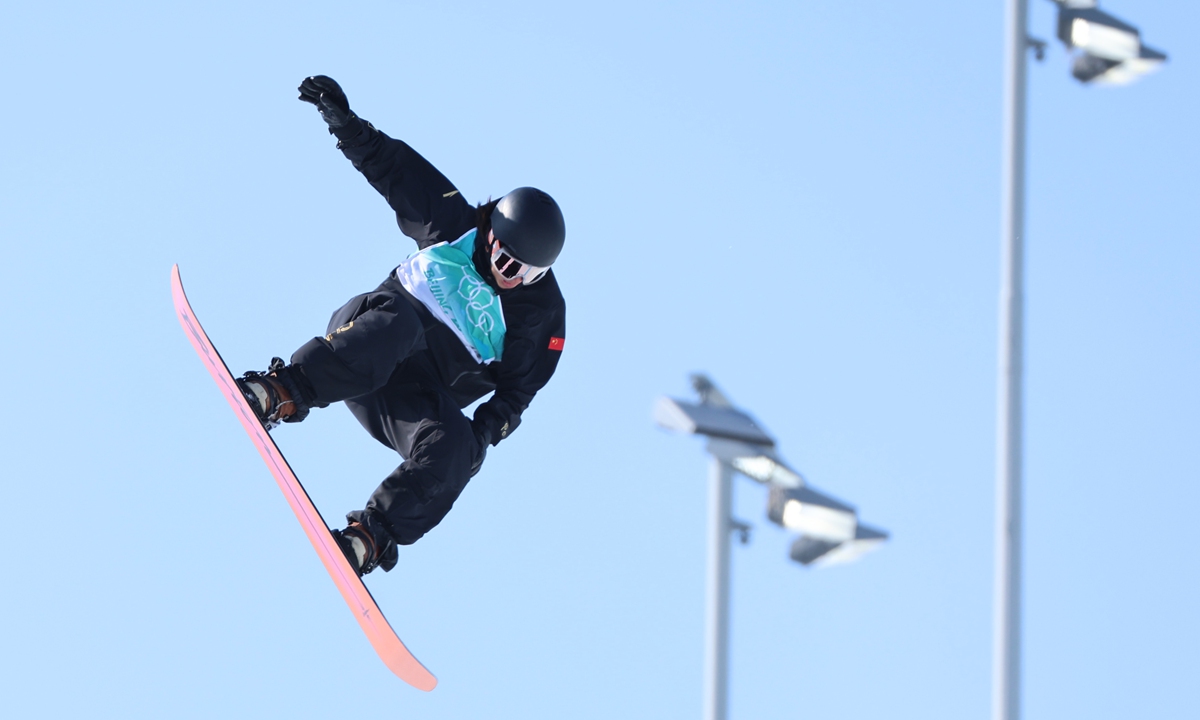
Su Yiming comptes in the men's big air freestyle snowboarding final on February 15. Photo: Li Hao/Global Times
In December 2021, he became the first Chinese snowboarder to win a big air World Cup event, in what was just his third World Cup start, in Steamboat, the US.He was also the first rider in history to land 1800s two ways in a FIS (International Ski Federation) competition - performing a backside triple cork 1800 and a frontside 1800.
His achievements, however, were not gained through mere talent but more importantly the sweat and tears he put into the sport. Injury has never been a stranger to him, and at the hardest times he even broke several snowboards during training in one week.
To him, talent has not played a big role. The more important thing is that he has an innate passion for snowboarding.
'Tale-like' friendship
Gu Ailing, Su's friend from when he was very young and a big hit herself among the Chinese public, also turned in another excellent performance by claiming silver in Tuesday's women's freeski slopestyle final, after bagging on February 8 her first Olympic gold medal in the women's freeski big air.
Su and Gu have been friends and teammates since their early years. A documentary released recently showed the 13-year-old Su and 14-year-old Gu training together, sharing the same joys, pains, struggles and goals.
In the documentary, Gu said, "I want to be a professional skier, but the premise is that it brings me happiness." And Su said, "If I ever have a chance, I would want to be a professional too. I'd keep trying until I am the best."
In an interview on Monday before their finals, Su said to both himself and Gu that he hoped she would perform well, but the most important thing of all is to enjoy and have fun.
This has prompted many to admire their "tale-like" friendship and even fantasized about the two "could become the coolest and cutest couple ever."
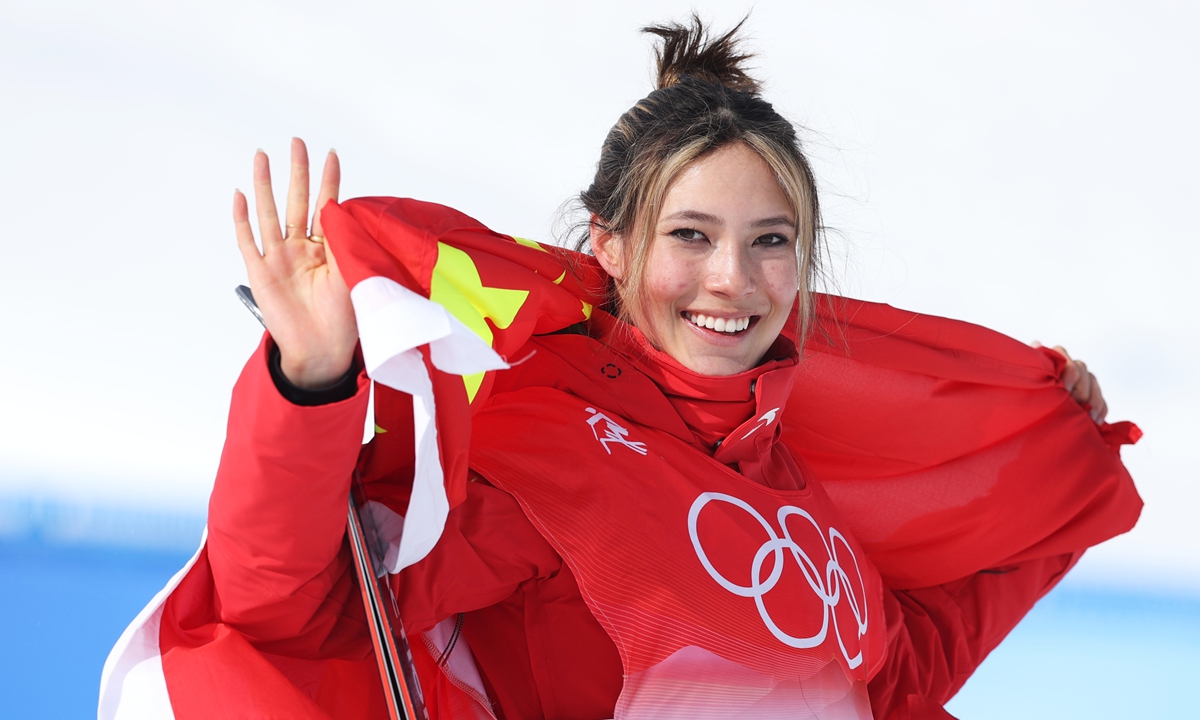
Gu Ailing celebrates after winning silver in the women's freeski slopestyle on February 15. Photo: VCG
On Tuesday Gu surprised audiences by earning the second-highest score of 86.23 while under heavy pressure during the third round of the slopestyle final. The score won her a precious silver medal, a first for Team China in the event."I really wanted to get on the podium, so I was happy and relieved when the third jump landed… I'm also very happy to be able to show the possibilities of the sport under pressure," she told CCTV.
Countless congratulations quickly flooded Chinese social media platforms. The hashtag "Gu Ailing won a silver medal" topped the trending list on China's Twitter-like Sina Weibo with over 1 billion views.
The General Administration of Sport of China sent a congratulatory letter to Gu, noting that "this is the first medal for a Chinese athlete participating in the freeski slopestyle final during the Winter Olympic Games. This is a breakthrough achievement in the sport."
The 18-year-old once again captured Chinese netizens' hearts with her strong mental fortitude and her bearing as she sincerely congratulated the gold medal winner, Swiss athlete Mathilde Gremaud.
During the second run, when most of the athletes had adapted to the environment and gradually reached superb levels, Gu fell, causing her ranking to slip from third to eighth. This put her under immense pressure during the third round, as she might have lost her chance at a medal if she didn't perform better in the third round. In the end, however, the young athlete pulled through.
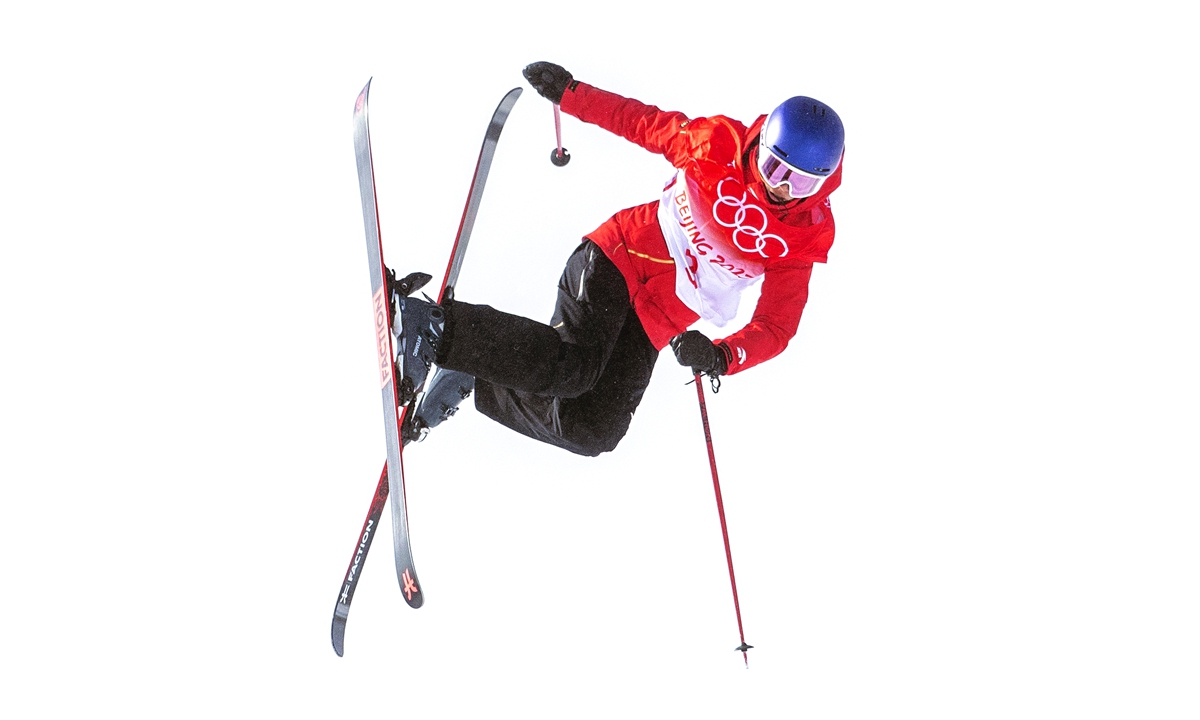
Gu Ailing competes in the women's freeski slopestyle final on February 15. Photo: Cui Meng/Global Times
"I was not in the right state during the first two runs. After the first run, I had a conversation with my mother, and she told me to pretend that the second run was the third run, and that there were no more chances later. I tried it, but it didn't work out well… But when it came to the real third run, I made it and I was proud of myself," she said in the CCTV interview.On Thursday, Gu will compete against other athletes in the women's freeski halfpipe qualification, an event in which she excels.
Also on Tuesday, Chinese snowboarder Rong Ge rounded out the big air competition at Shougang Big Air just outside the medals in the fifth place.
Although she did not win a medal, her performance was still encouraging not only because she was the first Chinese female to qualify for the big air finals at the Winter Olympics, but also her outstanding second-round performance with a high score of 85.75 high proves Chinese athletes' potential for the sport.
"For the fact that I can represent China to compete in the game, I just want to show the world that Chinese athletes have this potential," 19-year-old Rong told media after the event.

